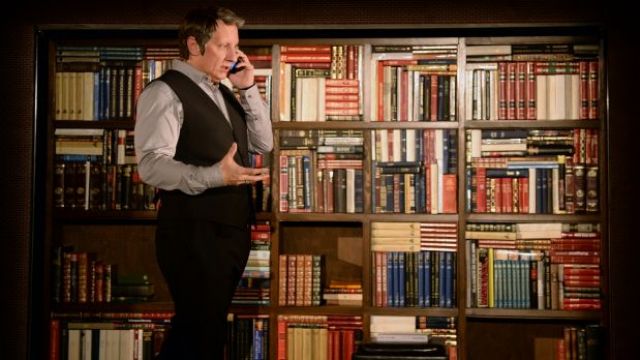887
Robert Lepage is alone on stage for two hours – two hours that are never less than engrossing and absorbing – and also sometimes very funny and sometimes very angry and at other times very, very sad. Although he talks us through his childhood memories and beyond, his show is, really, ‘about’ memory – that is, how our memories are shaped, formed and remain via context internal and external.
A framing device for this wonderful, ingenious, meticulously worked out show is a request made to Mr Lepage to perform Quebecoise Michèle Lalonde’s milestone poem ‘Speak White’ at a celebration, the 40th anniversary of La Nuit de la Poésie. ‘Speak White’ is an angry poem, originally a riposte from French-speaking Canadians to English speakers, who demand, ‘Speak White!’. But its reach extends to anyone, anywhere whose ethnicity is denied. The organisers of the evening, however, want Mr Lepage to speak the poem without reading it out – so he has to learn it – that is, memorise it – by heart. He finds this, at age fifty, frustratingly difficult… He hires someone to help him… but that’s another (comic) element of the story, one that asks the question, how will one be remembered?
He can’t remember his mobile phone number. But he can remember the phone number of the family apartment at 887 Avenue Murray, Quebec, where he grew up with his brother, two sisters, his housewife mother and his war veteran taxi driver father – and then his father’s mother, an Alzheimer’s sufferer. He can remember in amazing detail all the diverse inhabitants of the eight apartments in that building – and as he tells us about them (they are all interesting and representative in their way), the building itself appears on stage. Not a projection, but a scale model in which each of the eight apartments’ picture windows light up to reveal the key inhabitants inside. It is magical. It is just about perfect.
Such visual manifestations, aided by Laurent Routhier’s lighting and Jean-Sébastien Côté’s sound design, continue throughout, illustrating and complementing Mr Lepage’s performance and the text. The apartment building revolves… and becomes a library (another memory metaphor), a bunk bed bedroom (a theatre metaphor), an apartment kitchen, a bar, a garage… Lepage senior’s black taxi – in scale with the apartment – speeds across the stage, or parks outside, creating a powerful melancholy… (The magic is not entirely magic: Mr Lepage has eight or nine invisible but clearly hard working stagehands to dress and redress. At the end – and it’s a Lepage show tradition, they get a curtain call too.)
This visual artistry evokes a childlike awe and wonder in the audience. We are drawn in completely, not just to the family disruption of grandmother, but to the rise of the separatist Front Liberation de Quebec and the ensuing violence, the provocative visit of President de Gaulle, to the more bathetic visit of Queen Elizabeth and Prince Philip… And it is the collision of these public events with the private, family events that evoke the most powerful moments of Mr Lepage’s narrative. At the end, at least for me, the most moving of all is a tribute to his father, a solitary man of self-denying nobility.
 I should also say that, as well as dreaming all this up – albeit across years of refining and with brilliant collaborators (too many to name here) - as a performer and storyteller, Mr Lepage excels, keeping our attention engaged across his two hours. He can be the relaxed, at times ironic, narrator; he can be a comedian with perfect timing; he can create a dialogue with an invisible interlocutor; he can be forceful and outraged. At a couple of points he employs mime on the empty stage and yet again the clarity and skill are evident.
I should also say that, as well as dreaming all this up – albeit across years of refining and with brilliant collaborators (too many to name here) - as a performer and storyteller, Mr Lepage excels, keeping our attention engaged across his two hours. He can be the relaxed, at times ironic, narrator; he can be a comedian with perfect timing; he can create a dialogue with an invisible interlocutor; he can be forceful and outraged. At a couple of points he employs mime on the empty stage and yet again the clarity and skill are evident.
By the way, he remembers too his attendance at drama school – and then, in a conversation’ with a contemporary administrator (Mr Lepage plays himself and the smug administrator), learns that nowadays that school is a fee-paying institution. In other words, the artistry and brilliance and imagination we are seeing on stage comes from the son of a taxi driver, who, today, could not pay the fees, and so… (A sadly common phenomenon.)
This reads as a rave, I know. At times, when the text is in French, you need to be damn speedy reading the surtitles, but the synchronicity of performance, text and images is truly impressive, truly unforgettable. In terms of sheer emotion, Mr Lepage, alone on stage, goes further than in his previous, equally ingenious – both thematically and technically - shows. 887 demonstrates the power of specific detail to reach out to the universal.
Michael Brindley
Subscribe to our E-Newsletter, buy our latest print edition or find a Performing Arts book at Book Nook.

